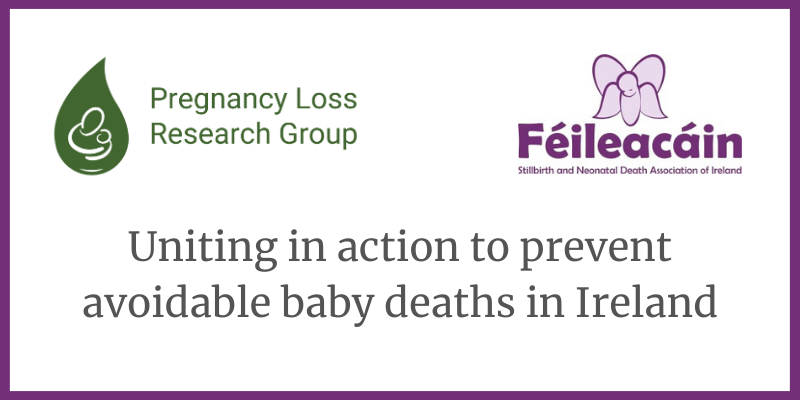News and media
Uniting in action to prevent avoidable baby deaths in Ireland

This World Patient Safety Day, the Pregnancy Loss Research Group and Féileacáin are calling on bereaved parents, healthcare providers, health care leaders and decision-makers, politicians, educators and communities, to unite in action to prevent avoidable baby deaths.
According to Mairie Cregan, Founder, Féileacáin:
World Patient Safety Day 2025 is dedicated to ensuring safe care for every newborn and child. We need to prioritise the ending of preventable baby deaths in Ireland. Our perinatal mortality rates certainly have room for improvement, having stayed the same for years. Targeted investment could reduce the number of baby deaths. Countries such as Australia and the UK have shown that this is possible, through dedicated investment in prevention strategies and in services.
Stillbirth is a tragic public health issue that affects about 200 families in Ireland each year. The number of baby deaths (perinatal mortality rate) in Ireland has been relatively static in recent years*. Ireland ranks poorly when compared to other countries internationally – 20th out of 24 countries in Europe in a review of trends from 2010 to 2021. There is much we can do to end preventable baby deaths.
Speaking on Patient Safety Day, Professor Keelin O’Donoghue, Consultant Obstetrician and Lead of the Pregnancy Loss Research Group said:
Preventive measures such as improved antenatal care, safer sleep campaigns, and early identification of risks are low-cost, evidence-based, and already proven in some countries to reduce stillbirths. Improving antenatal care also brings wider benefits, including better detection and treatment of risks that overlap with fetal growth restriction, preterm birth, and maternal mortality. Together, and with political will, we can end preventable baby deaths.
Ending preventable baby deaths is not only affordable but cost-effective, with every euro invested delivering more than triple the return by reducing medical, economic, and legal costs, while saving families and society from lifelong emotional and financial impacts.
Over the coming weeks the organisations will release a five-pillar action plan setting out how to end preventable baby deaths, focusing on (1) public awareness and education; (2) risk awareness and communication; (3) consistent care standards; (4) continuous care improvement; (5) research to improve care and outcomes.
This will complement existing policy briefs across a range of topics and other advocacy materials produced by the Pregnancy Loss Research Group.
*Unpublished data from 2023 show a fall in perinatal mortality rates, some of which is due to fewer babies with anomalies; we await publication of the full report.
Policy and advocacy resources
- Why don't we talk about pregnancy loss? https://www.ucc.ie/en/pregnancyloss/policyandadvocacy/whydontwetalkaboutpregnancyloss/
- PLRG Policy Briefs: https://www.ucc.ie/en/pregnancyloss/policyandadvocacy/policybriefs/
More information
The Pregnancy Loss Research Group leads national research to better understand pregnancy loss experiences and impacts, and the development of resources and evidence-based advice and interventions, to improve health care (quality) and health and social outcomes for women, babies and their families. This includes all types of pregnancy and infant loss, including first trimester miscarriage, second trimester miscarriage, ectopic pregnancy, molar pregnancy, multiple pregnancy complications, stillbirth, termination of pregnancy, neonatal death and pregnancy after loss. Website: www.ucc.ie/pregnancyloss
Féileacáin was formed by a group of bereaved parents to offer support to anyone affected by the death of a baby around the time of birth, and the organisation is now the national charity supporting families affected by perinatal loss. Website: https://www.feileacain.ie
For more information about all forms of pregnancy and baby loss, including details of support organisations, see the Pregnancy and Infant Loss Ireland Website: https://pregnancyandinfantloss.ie/
More about World Patient Safety Day
World Patient Safety Day calls for global solidarity and concerted action by all countries and international partners to improve patient safety. The Day brings together patients, families, caregivers, communities, health workers, health care leaders and policymakers to show their commitment to patient safety. The resolution WHA 72.6 ‘Global action on patient safety’ recognises patient safety as a global health priority and endorses the establishment of World Patient Safety Day to be observed annually on 17 September.
This year’s slogan, “Patient safety from the start!”, emphasizes the urgent need to act early and consistently to prevent harm throughout childhood, and yield benefits across the life course.
Key references
- MBRRACE-UK. MBRRACE-UK Perinatal Mortality Surveillance | UK perinatal deaths of babies born in 2023: State of the nation report. Version 2. 2025. Available from: https://timms.le.ac.uk/mbrrace-uk-perinatal-mortality/surveillance/
- NHS England. Saving Babies’ Lives Version Three: A care bundle for reducing perinatal mortality. Version 3.2. 2025. Available from: https://www.england.nhs.uk/publication/saving-babies-lives-version-three/
- San Lazaro Campillo I, Manning E, Corcoran P, Keane J, McKernan J, Greene RA, et al. Perinatal Mortality National Clinical Audit in Ireland Annual Report 2022. Cork: National Perinatal Epidemiology Centre; 2024. Available from: https://www.ucc.ie/en/media/training-2024/trainingacademia190/PerinatalMortalityFormReport2022-3526AW.pdf
- Kniffka MS, Schöley J, Lee S, Bertens LCM, Been JV, Gunnarsdóttir J; Euro-Peristat Network. Stillbirth rate trends across 25 European countries between 2010 and 2021: the contribution of maternal age and multiplicity. European Joural of Public Health. 2025;35(2):319-327.
- Stillbirth Centre of Research Excellence. Safer Baby - Working Together to Reduce Stillbirth. 2025. Available from: https://www.saferbaby.org.au/
- ten Hoope-Bender P, Stenberg K, Sweeny K. Reductions in stillbirths—more than a triple return on investment. The Lancet. 2016;387(10018):e14–6.


